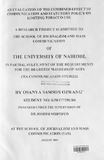| dc.contributor.author | Ojwang', Osanya Samson | |
| dc.date.accessioned | 2013-04-29T12:16:07Z | |
| dc.date.available | 2013-04-29T12:16:07Z | |
| dc.date.issued | 2008 | |
| dc.identifier.uri | http://erepository.uonbi.ac.ke:8080/xmlui/handle/123456789/17733 | |
| dc.description.abstract | The objectives of the study were to establish the impact of Information, Education and
Communication in reducing the abuse of tobacco; determine the impact of regulatory
control on smoking behaviour of Nairobi residents; and to determine the impact of tax
increase in reducing the smoking epidemic.
The population of interest were all traders handling cigarettes in Nairobi and smokers
in all smoking zones within the central business district in Nairobi. Out of the one
hundred sampled respondents smokers and traders in each case. 77 smokers and 54
traders responded representing a response rate of 77 per cent and 54 per cent
respectively. Data was collected through interviewer administered questionnaires. The
data was analyscd using descriptive statistics such as mean scores and percentages.
findings were presented in tables and charts.
The study established that advertisement plays very little role in introducing people to
smoking. It was found that 56 per cent of the smokers had tried between I - 4 times
without success to quit smoking. Different media has varying influence on the
memory of smokers. It was indicated that Television (TV) has the highest influence
on recall of anti - tobacco messages among smokers.
Results demonstrated that regulatory control on smoking has been very successful in
Nairobi. The ban on smoking has raised the percentage of people who smoke less than
5 cigarettes per day from 22 per cent before the ban to 38 per cent after the ban. The
ban has also reduced the percentage of smokers whose daily consumption is in excess
of 15 cigarettes per day from 35 per cent before the ban to 21 per cent after the ban. It
was found that tax increase on cigarettes has no significant impact on reducing
smoking but, has major impact in protecting the environment.
Given the importance of communication, education, and regulatory policies m
contro 11ing the use of tobacco it is recommended that:
v
i) Future tobacco control policies should focus on handling peer influence with
the aim of reducing its impacts on introducing non smokers to smokers.
ii) The ban on public smoking should be sustained and cigarette traders educated
about the importance of controlling tobacco use. Enforcement of the anti -
tobacco law should be strengthened through training of enforcement
authorities.
iii) Future research should investigate the communication strategies used by
behaviour change agents to improve message effectiveness in the tobacco
industry. | en |
| dc.description.sponsorship | The University of Nairobi | en |
| dc.language.iso | en | en |
| dc.subject | Communication and statutory policy | en |
| dc.subject | combined effect | en |
| dc.title | An evaluation of the combined effect of Communication and statutory policy | en |
| dc.type | Thesis | en |
| local.publisher | School of journalism and mass communication | en |

